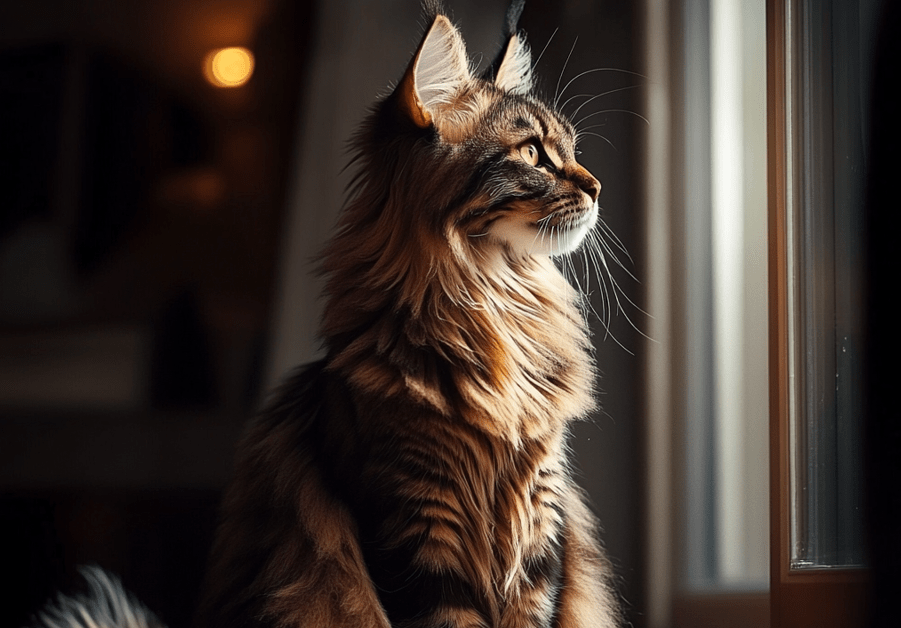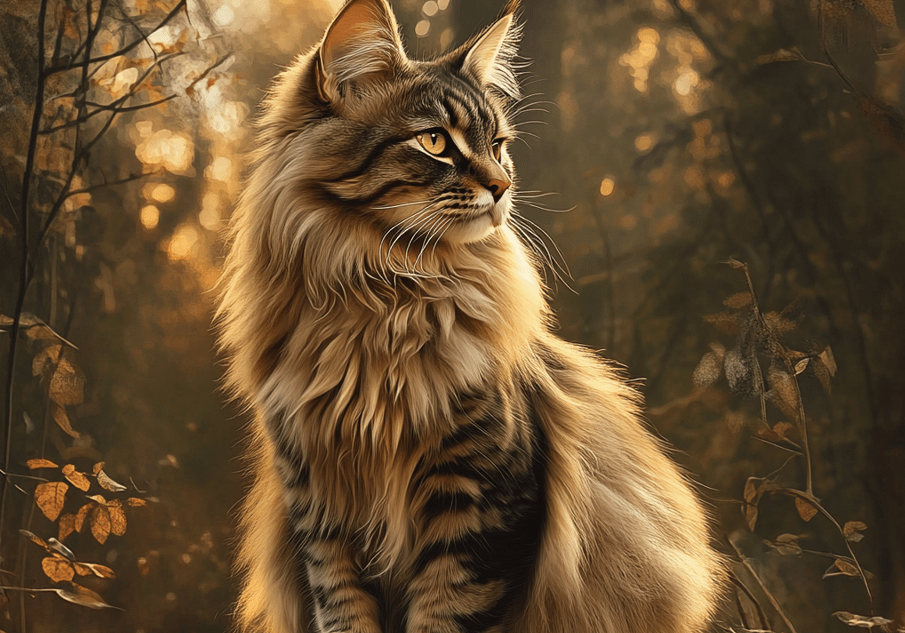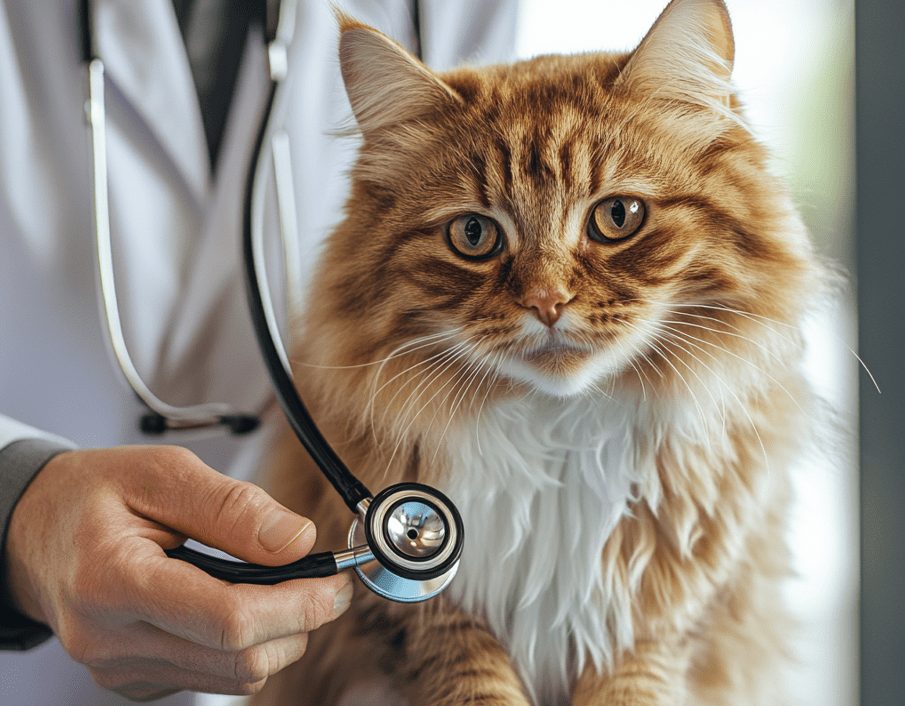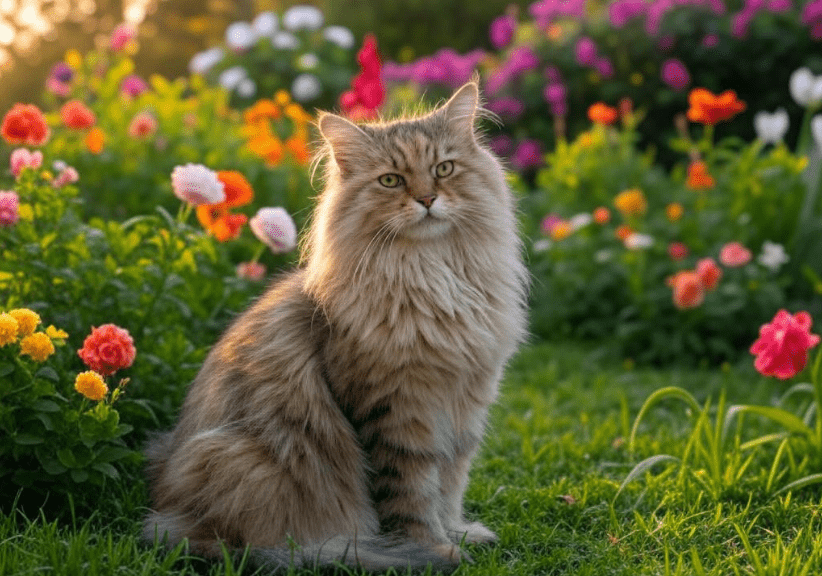
Maine Coon cats are renowned for their impressive size, tufted ears, and gentle personalities, but their journey to becoming majestic adults starts with proper nutrition in kittenhood. Knowing what to feed a Maine Coon kitten is critical to supporting their rapid growth, strong bones, and vibrant health. Maine Coon kittens have unique dietary needs due to their large size and slower maturation compared to other breeds. In this comprehensive guide, we’ll explore the best foods, feeding schedules, and nutritional tips to ensure your Maine Coon kitten thrives.
Why Maine Coon Kittens Need Special Nutrition
Maine Coons are one of the largest domestic cat breeds, often reaching 10–25 pounds as adults, with males typically larger than females. Their kittens grow rapidly but take longer to mature—up to 3–5 years—compared to other breeds. This extended growth period requires a carefully balanced diet to support:
Bone and Muscle Development: Their large skeletal structure demands sufficient protein and minerals.
Joint Health: Proper nutrition prevents strain on developing joints, reducing the risk of issues like hip dysplasia.
Immune System: A strong immune system protects against infections during their vulnerable early months.
Coat and Skin Health: Their thick, water-repellent coat needs nutrients like omega fatty acids for a glossy shine.
A diet tailored to their needs ensures healthy growth without overloading their system, setting the foundation for a long, active life.
Nutritional Needs of Maine Coon Kittens
To choose the right food, understanding the key nutrients Maine Coon kittens require is essential. Here’s a breakdown:
1. High-Quality Protein
Protein is the cornerstone of a Maine Coon kitten’s diet, supporting muscle growth and tissue repair.
Sources: Look for named animal proteins (e.g., chicken, turkey, fish) as the first ingredient in food labels.
Amount: Kitten food should contain 30–40% protein (dry matter basis) to meet their needs.
Why It Matters: Maine Coons’ large size requires robust muscle development, especially during their extended growth phase.
2. Healthy Fats
Fats provide energy and support coat and skin health, critical for Maine Coons’ dense fur.
Sources: Chicken fat, fish oil, or flaxseed oil are excellent choices.
Amount: Aim for 15–20% fat in kitten food.
Why It Matters: Fats supply concentrated energy for active kittens and omega-3/6 fatty acids for a shiny coat.
3. Calcium and Phosphorus
These minerals are vital for strong bones and teeth, given Maine Coons’ large skeletal structure.
Ratio: A calcium-to-phosphorus ratio of 1:1 to 1.3:1 is ideal.
Sources: Found in high-quality kitten foods or supplements (if recommended by a vet).
Why It Matters: Proper mineralization prevents skeletal issues like hip dysplasia.
4. Vitamins and Minerals
Vitamin A and D: Support vision, bone growth, and immune function.
Taurine: Essential for heart and eye health, especially in Maine Coons prone to hypertrophic cardiomyopathy (HCM).
Zinc and Biotin: Promote healthy skin and coat.
5. Water
Hydration is crucial for kidney health and digestion, particularly if feeding dry food.
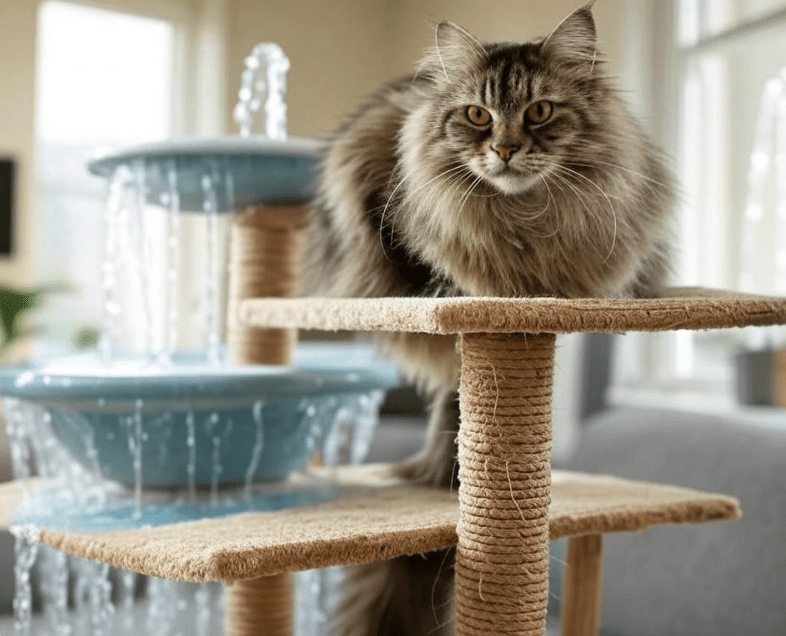
Sources: Wet food, fresh water, or cat fountains (Maine Coons love running water).
Why It Matters: Adequate water intake prevents urinary tract issues, common in large breeds.
Types of Food for Maine Coon Kittens
Choosing the right food type is key to meeting your Maine Coon kitten’s needs. Here are the main options, with pros and cons:
1. Wet Food (Canned)
Pros: High moisture content (70–80%) supports hydration, high protein, palatable for picky eaters.
Cons: More expensive, requires refrigeration after opening, can contribute to dental plaque if not balanced with dry food.
Best For: Kittens under 6 months, those needing extra hydration, or transitioning from mother’s milk.
2. Dry Food (Kibble)
Pros: Convenient, cost-effective, promotes dental health through chewing, long shelf life.
Cons: Lower moisture content (10%), may be less palatable, requires ample water access.
Best For: Kittens over 6 months, as a complement to wet food, or for free-feeding (with portion control).
3. Raw or Homemade Diets
Pros: Allows precise control over ingredients, mimics natural diet, high protein and moisture.
Cons: Risk of nutritional imbalances, bacterial contamination (e.g., salmonella), time-intensive.
Best For: Experienced owners working with a veterinary nutritionist to ensure balance.
4. Semi-Moist Food
Pros: Palatable, convenient, higher moisture than kibble.
Cons: Often contains fillers or artificial preservatives, less nutrient-dense.
Best For: Occasional treats, not a primary diet due to lower nutritional value.
Recommended Approach
A combination of wet and dry food is ideal for most Maine Coon kittens, providing hydration, protein, and dental benefits. Wet food should make up 60–80% of their diet in the first 6 months, with dry food introduced gradually. Avoid raw diets unless guided by a vet, as Maine Coon kittens are sensitive to nutritional deficiencies during growth.
Choosing the Best Commercial Kitten Food
When selecting commercial food, prioritize brands formulated for kittens and suited to Maine Coons’ needs. Here’s what to look for:
Key Criteria
AAFCO Approval: Ensure the food meets the Association of American Feed Control Officials (AAFCO) standards for kitten growth.
Named Protein Sources: Ingredients like “chicken” or “salmon” should be first, not vague terms like “meat by-products.”
No Fillers: Avoid foods with excessive corn, wheat, or soy, which offer little nutritional value.
Joint Support: Look for added glucosamine or chondroitin to support Maine Coons’ developing joints.
Calorie Density: Maine Coon kittens need calorie-dense food (100–120 kcal/oz for wet, 400–500 kcal/cup for dry) to fuel growth.
Top Food Types for Maine Coons
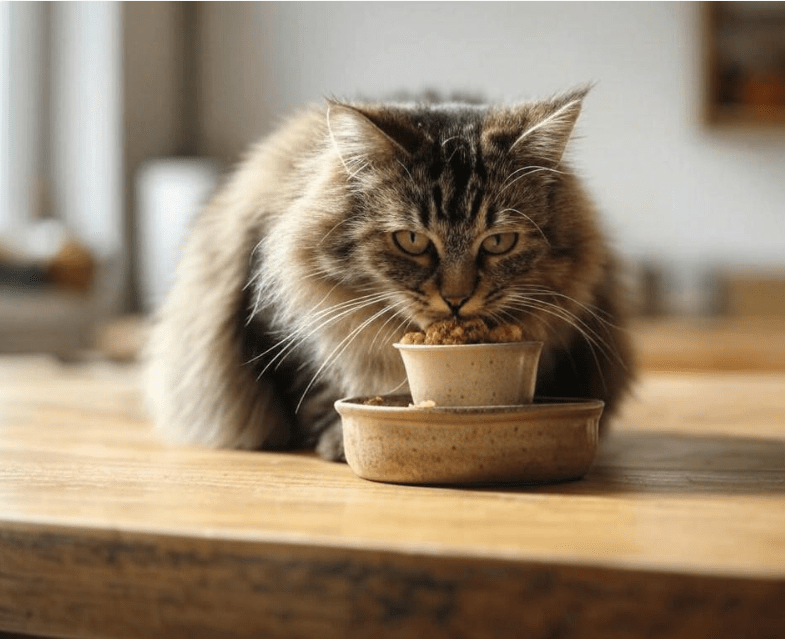
Large Breed Kitten Formulas: Brands like Royal Canin or Hill’s Science Diet offer formulas for large-breed kittens, tailored to Maine Coons’ size and growth rate.
High-Protein Kitten Foods: Look for brands like Orijen, Wellness Core, or Blue Buffalo with 35%+ protein.
Grain-Free Options: Suitable for Maine Coons with sensitivities, but ensure they’re balanced (e.g., Instinct or Taste of the Wild).
Wet Foods for Hydration: Brands like Weruva or Tiki Cat provide high-moisture, protein-rich options.
Tips for Selection
Read Labels: Check for high-quality ingredients and avoid artificial additives.
Consult Your Vet: Get recommendations based on your kitten’s health and growth stage.
Check Reviews: Look for feedback from Maine Coon owners to ensure suitability.
Feeding Schedule for Maine Coon Kittens
Maine Coon kittens have high energy needs and small stomachs, requiring frequent, small meals. Here’s a recommended schedule by age:
0–3 Months
Frequency: 4–6 meals per day (every 3–4 hours).
Amount: 1–2 tbsp wet food per meal or 1/8–1/4 cup kibble, adjusted based on appetite.
Notes: Focus on wet food to mimic mother’s milk. Free access to water is essential.
3–6 Months
Frequency: 3–4 meals per day (every 4–6 hours).
Amount: 2–3 tbsp wet food or 1/4–1/3 cup kibble per meal.
Notes: Introduce dry food gradually, mixing with wet food to ease transition.
6–12 Months
Frequency: 2–3 meals per day (every 6–8 hours).
Amount: 3–4 tbsp wet food or 1/3–1/2 cup kibble per meal.
Notes: Monitor weight to avoid overfeeding, as Maine Coons grow rapidly.
After 12 Months
Frequency: 2 meals per day.
Amount: Adjust based on weight and activity (typically 1/2–3/4 cup kibble or 5–6 oz wet food daily).
Notes: Transition to adult food around 18–24 months, as Maine Coons mature slowly.
Tips for Feeding
Portion Control: Use a measuring cup to avoid overfeeding, which can lead to obesity.
Consistent Times: Feed at the same times daily to establish a routine.
Monitor Growth: Weigh your kitten monthly to ensure they’re growing steadily (1–2 pounds per month in the first 6 months).
Supplements for Maine Coon Kittens
While a balanced diet provides most nutrients, supplements can support specific needs, especially for Maine Coons’ size and joint health. Always consult a vet before adding supplements.
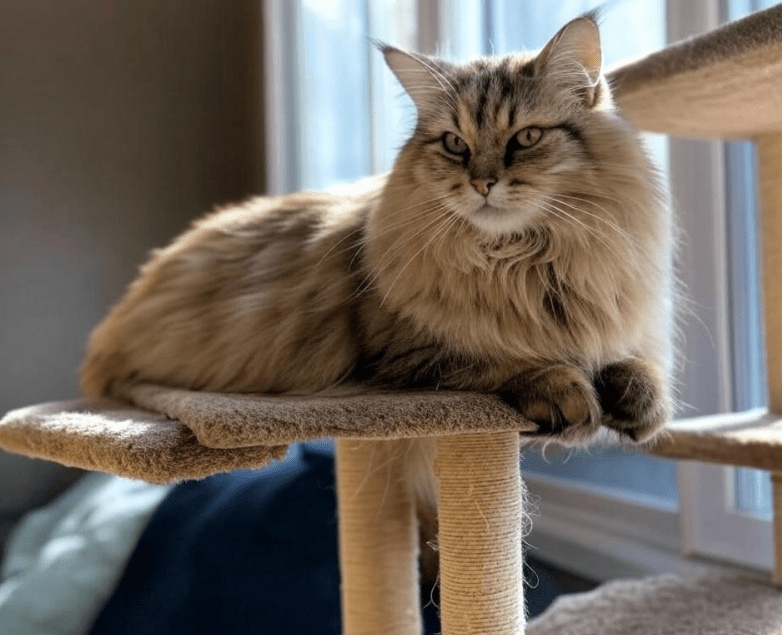
Common Supplements
Omega-3 Fatty Acids: Fish oil supports coat, skin, and joint health.
Glucosamine and Chondroitin: Promote joint development, reducing the risk of hip dysplasia.
Probiotics: Aid digestion and boost immunity, especially during food transitions.
Taurine: Essential for heart and eye health; most kitten foods include it, but check labels.
When to Use
Joint Support: Start glucosamine around 6 months for kittens from lines with hip dysplasia history.
Digestive Health: Use probiotics during weaning or diet changes.
Coat Health: Add omega-3s if the coat appears dull or flaky.
Cautions
Avoid over-supplementation, as excess vitamins (e.g., vitamin D) can be toxic.
Choose vet-approved, pet-specific products to ensure safety.
Foods to Avoid for Maine Coon Kittens
Certain foods are harmful or nutritionally inadequate for Maine Coon kittens. Avoid:
Human Foods: Chocolate, onions, garlic, grapes, and dairy (after weaning) are toxic or cause digestive upset.
Raw Meat/Fish (Unsupervised): Risk of bacterial contamination or nutrient imbalances without vet guidance.
Adult Cat Food: Lacks the calorie and nutrient density needed for kitten growth.
Low-Quality Foods: Brands with fillers (corn, soy) or artificial additives offer poor nutrition.
Dog Food: Not formulated for cats, lacking essential nutrients like taurine.
Signs of Food Issues
-
Vomiting or diarrhea
-
Lethargy or poor growth
-
Dull coat or excessive shedding
-
Contact a vet if these occur, as they may indicate food intolerance or toxicity.
Hydration for Maine Coon Kittens
Maine Coons are prone to urinary tract issues, making hydration critical. Tips include:
Fresh Water: Provide clean water daily, ideally in a wide, shallow bowl or cat fountain (Maine Coons prefer running water).
Wet Food: High moisture content supports kidney health and prevents dehydration.
Multiple Water Stations: Place bowls in different areas to encourage drinking.
Monitor Intake: Reduced drinking or frequent urination may signal health issues; consult a vet.
Transitioning Foods for Maine Coon Kittens
Maine Coon kittens have sensitive digestive systems, so food transitions must be gradual to avoid upset:
Weaning (4–8 Weeks): Transition from mother’s milk to wet kitten food over 1–2 weeks, mixing milk replacer if needed.
Wet to Dry (3–6 Months): Introduce kibble by mixing 10% dry with 90% wet, increasing dry over 7–10 days.
Kitten to Adult Food (18–24 Months): Gradually shift to adult food over 10–14 days, as Maine Coons mature slowly.
Tips for Smooth Transitions
-
Monitor for diarrhea or refusal to eat, slowing the transition if needed.
-
Use the same brand for consistency when possible.
-
Offer small, frequent meals to ease digestion.
Common Feeding Mistakes to Avoid
To ensure healthy growth, steer clear of these pitfalls:
Overfeeding: Leads to obesity, straining joints and increasing health risks.
Inconsistent Feeding: Irregular schedules cause stress or overeating.
Ignoring Weight Gain: Monitor body condition to prevent excessive weight, especially in large breeds.
Using Low-Quality Food: Cheap foods lack essential nutrients, stunting growth.
Neglecting Hydration: Inadequate water intake risks urinary issues.
Special Considerations for Maine Coon Kittens
Feeding needs may vary based on your kitten’s circumstances:
Rescue Kittens: May need nutrient-dense food or supplements to catch up on growth; consult a vet.
Show Kittens: Require premium diets for optimal coat and muscle development.
Kittens with Health Issues: Conditions like HCM or food sensitivities require vet-guided diets.
Multi-Cat Households: Ensure each kitten gets their portion, as Maine Coons can be competitive eaters.
Consulting a Veterinarian
Regular vet checkups are crucial for tailoring your Maine Coon kitten’s diet:
Growth Monitoring: Track weight and body condition to ensure healthy development.
Diet Adjustments: Modify food based on age, activity, or health needs.
Screening for Issues: Check for breed-specific risks like HCM or hip dysplasia that may influence diet.
Work with a vet familiar with large breeds for personalized advice.
Conclusion
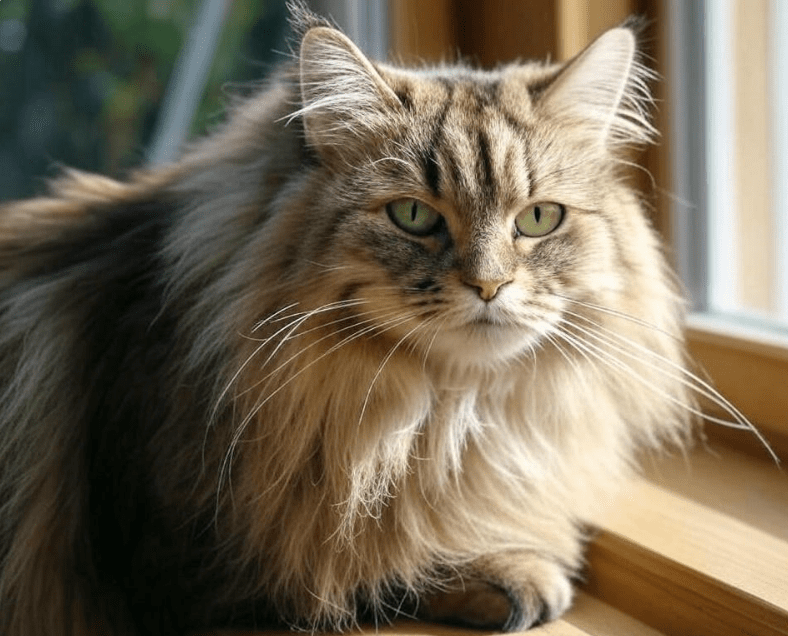
Knowing what to feed a Maine Coon kitten is the key to unlocking their potential as healthy, vibrant adults. By prioritizing high-quality protein, healthy fats, and essential nutrients, choosing the right wet and dry foods, and following a structured feeding schedule, you can support their rapid growth and unique needs. Avoid common mistakes like overfeeding or using low-quality foods, and ensure proper hydration to protect their long-term health.
With this comprehensive guide, you’re equipped to make informed feeding choices, giving your Maine Coon kitten the best start in life. Consult your veterinarian to create a tailored plan, and watch your gentle giant grow into a magnificent, healthy companion.

